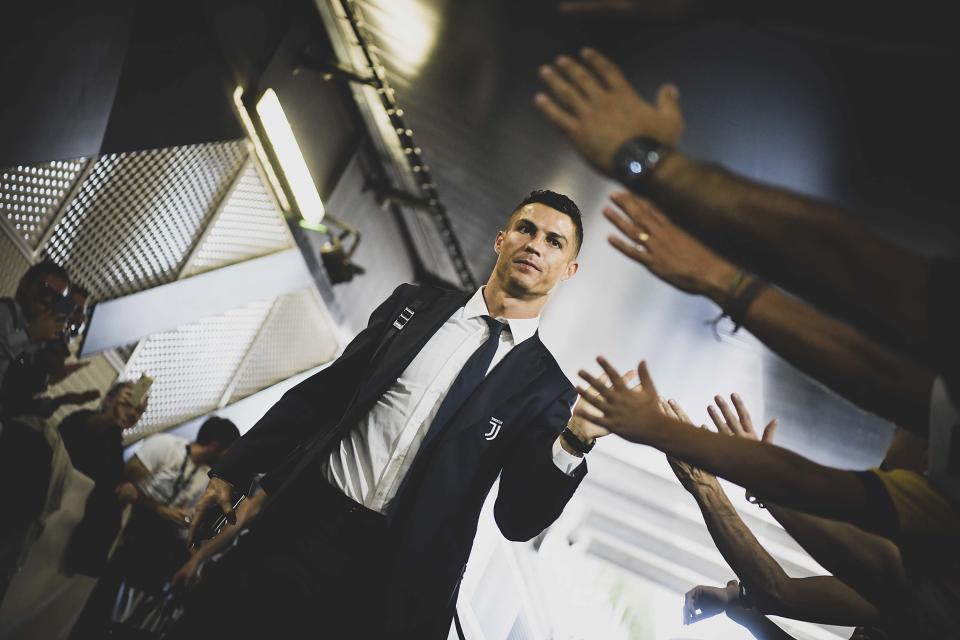Don't 'Just Do It': How does Nike handle Ronaldo's billion-dollar deal now?
Two years ago, Nike announced a blockbuster deal worth a reported $1 billion. It wasn’t with a league or even a team. It was with one athlete.
Cristiano Ronaldo.
The deal was reportedly “for life,” a rare arrangement with an athlete similar to those struck with Michael Jordan and LeBron James.
In a strictly financial sense, it seemed like quite a good deal for Nike. One report suggested Ronaldo generated nearly a half-billion dollars in 2016 for Nike with his social media presence alone. Just last month, he tweeted a photo of himself tying a new pair of Nikes and it received nearly 100,000 likes from his 75 million followers.
But only a matter of days after that post, the fabled Ronaldo story changed. The German news outlet Der Spiegel reported on detailed and disturbing rape allegations made by an American woman named Kathryn Mayorga, who Ronaldo met in Las Vegas in 2009.
Ronaldo has steadfastly denied the allegations. But Nike is now in a spot. Its deal with Ronaldo indicated a belief in his marketing power not only for the remainder of his career, but for many years after. Ronaldo looked like the next David Beckham — royalty after retirement. Now it’s unclear what exactly he represents.
“We are deeply concerned by the disturbing allegations and will continue to closely monitor the situation,” Nike said in a statement after the Der Spiegel report.

Suddenly one of the more reliable athletes in the financial world is riskier to do business with. And the response from Ronaldo and his club hasn’t been altogether helpful. Ronaldo claimed “fake news” on social media and Juventus raved about the star as a “great champion.” Neither of those were direct denials, and seemed tone-deaf at best. “It has a lot of connotations of being a very embarrassing and unpleasant situation,” says Mark Conrad, director of the sports business program at the Gabelli School of Business at Fordham.
Making this even more layered is Nike’s recent Colin Kaepernick campaign. That ad push took guts, deliberately venturing outside of athleticism and (depending on the audience) toward idealism. It was bold and it relied a lot on Nike being an arbiter of taste.
“By using Kaepernick, Serena, and so many others, Nike took a stand for racial equality and equality of gender,” says Patrick Rishe, director of the sports business program at the Washington University in St. Louis. “They’re standing for progressive thinking. If Ronaldo did what is claimed, those actions are not at all consistent.”
Nike has touted Ronaldo’s character. On its site it calls him “an inspiration, on the field and off,” and has a passage devoted to his persona: “Ronaldo has said that he’d rather be remembered as a role model than a legendary football player — though he’ll likely be remembered as both.” The site then offers a link to shop at Nike F.C.
It is, of course, quite possible that Ronaldo won’t be found to have done anything wrong. Despite a re-opened investigation by the Las Vegas Police Department, he has not been charged with anything, and the Brett Kavanaugh confirmation saga shows there is a strong resistance to labeling anyone guilty in the court of public opinion. Ronaldo is heavily involved in charity work and he has the backing of literally millions of fans. There is great risk in cutting ties, or even distancing from him.
The larger uncertainty is how to calibrate the effect of scandal in the #MeToo era. Kobe Bryant is almost universally loved, and his 2003 rape case is rarely mentioned. Tiger Woods, although certainly never alleged to have committed assault, emerged from scandal to be more popular than any other golfer on the planet. But that was then. “I do wonder,” Rishe says, “if Tiger had done what he had done now, would that have had more damning consequences?”
[ Follow Yahoo Soccer on Twitter and Facebook ]
Ronaldo is in a way a test case for the long-term marketing deal in the social media era. He has an incredible reach with or without Nike, but that also means a drop-off in his popularity would be very obvious very quickly. There are other soccer stars out there, most notably Kylian Mbappe of France and even Christian Pulisic of the U.S. Both are Nike athletes.
“Nike is in a very difficult position,” Rishe says. “They can’t cut ties but they have to be ready.”
It’s also fair to ask how many soccer fans — especially in America — even care. If the shoe looks good on the rack, will buyers factor in an athlete’s reputation in between picking it up and checking out?
Rishe says yes.
“You’d be very surprised,” he argues. “You have a lot of young kids who look up to these star athletes, kids who are going to be lifelong customers. This is something that’s very influential.”
So no matter what happens, there will be some consumers who are less enamored with Ronaldo. Whether that’s fair or not is up for debate. Whether it lasts or not might be the bigger question.
“His image has to be affected,” says Conrad. “If you’re at Nike, this can hardly be something you want for a lifetime endorser.”

 Yahoo Sports
Yahoo Sports 